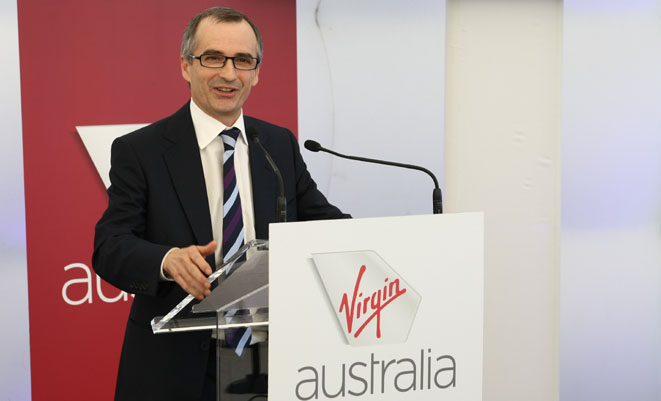
Virgin Australia will have just the third chief executive in its near 20-year history by the start of 2020, with current boss John Borghetti announcing his intention to step down some time in the next 18 months.
Borghetti has “advised the board he will not renew his contract post 1 January 2020”, Virgin Australia said in a statement to the Australian Securities Exchange (ASX) on Tuesday.
“Mr Borghetti has signalled his desire to depart by this date to enable the Group ample time to recruit an incoming CEO and allow for an appropriate transition,” the Virgin Australia statement said.
Virgin Australia chairman Elizabeth Bryan said the board would commence a global search for a successor.
“The board and I are grateful to John for providing a generous period of time for the search for the CEO and an appropriate transition of leadership,” Bryan said in the statement.
“I would like to acknowledge John’s enormous contribution to the Virgin Australia Group to date and thank him for his continued dedication.”
Borghetti said it was a privilege to serve as the chief executive of the Virgin Australia group and lead a “wonderful team of 10,000 people”.
“By notifying the board of my intentions now, it provides them with an appropriate time to conduct a thorough recruitment process and for me to support the transition,” Borghetti said.
“In the interim, I look forward to continuing in the role of CEO and remain focused on delivering the goals of the Virgin Australia Group.”
The veteran aviation executive has spent more than four decades in aviation, having worked at Qantas for 37 years where he rose to executive general manager. He left the Flying Kangaroo in 2009, after Alan Joyce was named chief executive.

Borghetti has been Virgin Australia chief executive for a little over eight years, having succeeded Brett Godfrey in May 2010. He is just the second chief executive in the airline’s history.
Under his leadership, the airline has been transformed from a low-cost carrier into an airline group with a full service (Virgin Australia) and low-cost-carrier (Tigerair Australia) arm, as well as regional and cargo operations and a frequent flyer program nudging nine million members.
However, what has eluded Virgin Australia under Borghetti has been consistent profitability, with the airline group racking up losses in excess of $1 billion over the past five financial years. The expansion into new markets, investment in upgraded products both on the ground and in the air also took its toll on the company’s balance sheet.
And Borghetti’s departure comes as the airline is facing challenges on a number of fronts.
First, Virgin Australia is in the midst of a three-year transformation program that has involved the disposal of Embraer E190 regional jets and some ATR turboprops, as well as the transition of Tigerair Australia Airbus A320s to Boeing 737-800s and capital raising efforts to boost the company’s balance sheet.
Meanwhile, Air New Zealand signalled it was walking away from the pair’s trans-Tasman joint-venture alliance when it ends in October, leaving Virgin Australia without a local partner in the domestic New Zealand market.
And the airline is battling a resurgent Qantas that is making healthy profits in the domestic Australian market while Virgin Australia struggles for profitability.
Finally, there is ongoing speculation about the company’s share register, which features five major shareholders in Etihad Airways, HNA Group, Nanshan, Singapore Airlines and Sir Richard Branson’s United Kingdom-based Virgin Group, and whether the company would eventually be delisted from the ASX and taken private.
Nonetheless, Borghetti is credited with the transformation of Virgin Blue to a full-service and diversified airline group and adding competition to the Australian aviation sector.
 Despite recent struggles, Virgin Australia posted a positive underlying profit before tax for the six months to December 31 2017 and pointed to an improved underlying performance in the second half of the 2017/18 compared with the prior corresponding period.
Despite recent struggles, Virgin Australia posted a positive underlying profit before tax for the six months to December 31 2017 and pointed to an improved underlying performance in the second half of the 2017/18 compared with the prior corresponding period.
Moody’s Investors Service also lifted its outlook for Virgin Australia from negative to stable in May 2018.
In recent times, Borghetti has taken less of a day-to-day role in the running of the airline. In 2016, John Thomas was appointed as Virgin Australia group executive for airlines. However, he lasted less than a year in the role.
In November 2017 Rob Sharp was appointed to the role.
While it was unclear what Borghetti’s next step will be, he currently sits on the board of drinks company Coca-Cola Amatil. And his previous director positions included being on the board of CARE Australia, The Australian Ballet, Piper Aircraft USA and Energy Australia.




